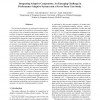Free Online Productivity Tools
i2Speak
i2Symbol
i2OCR
iTex2Img
iWeb2Print
iWeb2Shot
i2Type
iPdf2Split
iPdf2Merge
i2Bopomofo
i2Arabic
i2Style
i2Image
i2PDF
iLatex2Rtf
Sci2ools
RTSS
2007
IEEE
2007
IEEE
Integrating Adaptive Components: An Emerging Challenge in Performance-Adaptive Systems and a Server Farm Case-Study
The increased complexity of performance-sensitive software systems leads to increased use of automated adaptation policies in lieu of manual performance tuning. Composition of adaptive components into larger adaptive systems, however, presents challenges that arise from potential incompatibilities among the respective adaptation policies. Consequently, unstable or poorly-tuned feedback loops may result that cause performance deterioration. This paper (i) presents a mechanism, called adaptation graph analysis, for identifying potential incompatibilities between composed adaptation policies and (ii) illustrates a general design methodology for co-adaptation that resolves such incompatibilities. Our results are demonstrated by a case study on energy minimization in multi-tier Web server farms subject to soft real-time constraints. Two independently efficient energy saving policies (an On/Off policy that switches machines off when not needed and a dynamic voltage scaling policy) are show...
Adaptation Graph Analysis | Adaptation Policies | Applied Computing | Potential Incompatibilities | RTSS 2007 |
| Added | 04 Jun 2010 |
| Updated | 04 Jun 2010 |
| Type | Conference |
| Year | 2007 |
| Where | RTSS |
| Authors | Jin Heo, Dan Henriksson, Xue Liu, Tarek F. Abdelzaher |
Comments (0)

